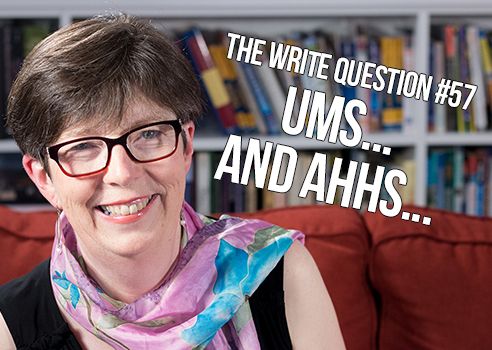Viewing time: 5 minutes
The Write Question is a weekly video podcast about writing that I started in 2017 and that ran, more or less weekly, until April 2022. This is a republication of issue #57, with advice on how to stop verbal tics. The post first ran on May 25/18.
Transcript:
Welcome to The Write Question, I’m Daphne Gray-Grant. Today I’m giving advice on how to remove verbal tics.
I have a question from Mike Hernandez who is based in San Diego, California. Here’s what he asked via email:
“I know a person who ends almost every sentence with an “uh huh” or “mm mm.” I hought it might be due to a very emotional, traumatic event he went through when he was in his early 20’s, about the time it started. In addition to being very aware of it and practicing not making the sounds, do you have any other advice to help stop it?”
Thanks for the question, Mike. In addition to being a professional writer and editor, I’m also a debate coach at my local high school, and THAT’S the knowledge I’m going to be calling on to answer your question.
I’ve worked with dozens of students over the last 10 years and I don’t think it matters how verbal tics arise. You might be right that in your friend’s case they stemmed from an emotional trauma but I’ve also seen people who umm and ah to beat the band, with no precipitating event. More often, I think, it’s just a bad habit. And like all habits, it takes some diligence to get rid of it.
The first thing any speaker needs to do is to be aware of problem. Does your friend realize that he’s falling back on verbal tics? And that they’re annoying his listeners? If not, the first step is to generate awareness. One of the best ways to accomplish this is to persuade him to record himself so he can hear how terrible he sounds. Note that I don’t suggest this to embarrass him but to make him aware. Make the suggestion kindly and with great tact.
You might also point out that there are many successful people who make exactly the same mistake. My favourite example is the current Prime Minister of Canada. In the description below I provide a link to a YouTube video in which Justin Trudeau uses umm 50 times in just over one minute! (This may make your friend feel better!)
Be aware that some people also have visual tics. They may sway when they speak. They may flip their hair. They may jingle coins in their pockets. If you have a friend with these types of habits, you might want to suggest video-taping rather than just a voice recording. I judged a debate competition last weekend and I saw a young woman twisting an elastic on her hand while she was speaking. It was incredibly distracting but I’m sure she didn’t even realize she was doing it.
After you’ve identified the problem with the person, then you can deal with it. Be aware that this is a long-term project. I had a big problem with my own speaking style — I used to say umm and ahh a lot — and I have been working diligently to remove those tics from my vocabulary for two years now. I am MUCH better than I used to be but still not perfect.
Do I get discouraged that it’s taken me two years so far? No! I know I’m so much better than I used to be. I wish the process were faster but it isn’t and I’m just continuing to work at it.
If your friend is really concerned about his umm/ahh problem, he might want to consider joining an organization like Toastmasters. They are really good at helping speakers combat such issues. One of the tricks they use is they have someone in the audience who claps or makes a noise every time a speaker uses umm or ahh. Believe me, this technique is very effective. I’ve included a link to the Toastmaster’s website below.
But, probably the biggest secret I can give your friend is to SLOW DOWN his speaking style. Western Society dislikes silence. I think we fear that it makes us look stupid or inarticulate. But if your friend can increase his comfort with silence, then he can use that time to THINK about what he wants to say in advance of actually saying it.
Generally, we say “umm” or “uhh” to give ourselves time to think. Instead of doing that use silence [….3-second pause…] to perfectly craft your sentence before it comes out of your mouth.
Silence is not only okay — it’s a great device for emphasis and for getting attention. And it’s certainly far superior to umm or ahh.
Finally, let me wrap up with a quote from ancient Chinese philosopher Lao Tzu: “Silence is a source of great strength.”
Thanks for your question, Mike. If your friend can become more comfortable with silence, I’m sure he’ll be successful at dealing with his verbal tics.


